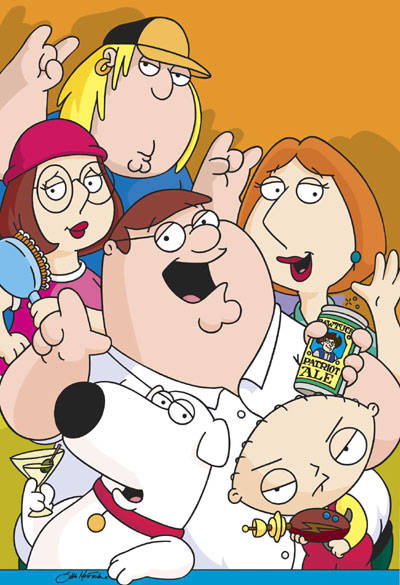 Not all stoner/buddy comedies are created equal; they come in all shapes and sizes. That size differential is illustrated, quite literally, in Seth MacFarlane’s new film Ted. It’s the story of a young boy named John (played by Mark Wahlberg) whose Christmas wish that his favorite teddy bear could talk is not only fulfilled, but majorly shifts the course of the rest of his life. Newly sentient Ted (voiced by MacFarlane himself) grows into a rather vulgar, but unquestionably loyal friend who continues to live with John — much to the chagrin of his girlfriend (Mila Kunis).
Not all stoner/buddy comedies are created equal; they come in all shapes and sizes. That size differential is illustrated, quite literally, in Seth MacFarlane’s new film Ted. It’s the story of a young boy named John (played by Mark Wahlberg) whose Christmas wish that his favorite teddy bear could talk is not only fulfilled, but majorly shifts the course of the rest of his life. Newly sentient Ted (voiced by MacFarlane himself) grows into a rather vulgar, but unquestionably loyal friend who continues to live with John — much to the chagrin of his girlfriend (Mila Kunis).
Ted proved to be a witty, enjoyable romp, which may come as a surprise to detractors of MacFarlane’s long-running animated series Family Guy. The show first aired in 1999, suffered cancellation in 2002, and somehow found itself reinstated at the whim of Fox in 2004. However, Family Guy’s ever-increasing dependence on cut-away jokes and otherwise random sensibilities made it subject to a growing wave of backlash that ultimately had a large faction of people writing it off entirely.
It, of course, did the show no favors that South Park artfully mocked Family Guy on this point; insinuating the show’s unsystematic jokes were constructed by manatees. Despite this glaring truth, I defended Family Guy for the longest time, not buying into the hate and still enjoying the pop culture ratatouille that comprised its humor. It wasn’t until MacFarlane began to openly scorn his fans by crafting episodes devoid of humor just to manipulate his remaining viewers. At that point, I threw in the towel.
Ted’s unexpected quality, both in terms of writing and performance, lends strong support to the argument that perhaps the time has come for MacFarlane to retire the Family Guy series and stick to making movies. Despite being his first feature, MacFarlane demonstrates a reserve and a commitment to structure unseen in any of the Family Guy seasons; something you can observe for yourself by revisiting nearly all of them on Netflix’s Watch Instantly service. You’ll notice a few trends and characteristics that, while not wholly absent from Ted, are restrained in service of the film.
As previously mentioned, one of the biggest criticisms of Family Guy is that it’s humor relies on a frantic, discordant series of geeky nods and cut-away pop culture references unrelated to the central story arc of the episode. I need only point you to the extended Starlight Express joke that interrupts Season 8’s “Extra-Large Medium.” In Ted, there are a couple of these same plot diversions, one in which a certain scene from a certain cult classic 80s sci-fi movie is re-imagined, but even these are directly tied into the characters and their well-established quirks. It never feels like an obnoxious non sequitur.
As to the pop culture references, at first it was hard to pinpoint why a Susan Boyle reference from a talking teddy bear would not be groan-inducing while all the Geico jokes in the Farrelly Brothers Three Stooges were so insipid. Because Ted is established to be a character who spends all his time getting high and watching TV, his spouting of pop culture milestones is neither illogical (given what we know of him) nor does it comprise his entire bag of comedy tricks. Three guys who grew up in an orphanage their entire lives making multiple references to an insurance company on the other hand is a hard pill to swallow.
MacFarlane also demonstrates an understanding of three-act structure in Ted, unseen in Family Guy for a long time. The story is well paced and actually avoids many of the unfortunate pitfalls of romantic comedies. Every character’s motivation at all times is genuine and never feels forced for the sake of wrapping things up or progressing to the next joke. This of course runs counter to Family Guy’s slapped-together, get-to-the-plot-eventually story structure that often eats up two-thirds of a given episode with red herring scenarios. The film creates characters we like and can relate to despite the film’s fantastical conceit. For all their hilarious vulgarity, John and Ted are impossibly amiable. It would seem having to work within a feature film format is pressing MacFarlane to obtain a coherence of storytelling that 30-minute comedy hiccups like Family Guy do not require.
If anything is evident from the later episodes of Family Guy on Netflix, it’s that MacFarlane’s passion for the show is dwindling. The jokes are getting weaker, the stories are even shakier, and non sequiturs are running even more rampant; battles with giant chickens occupying more and more of the run-time. It’s clear from Ted that MacFarlane’s spark has been renewed in features, and if Hollywood gives him more opportunities to challenge himself in this fashion, he’ll undoubtedly prove himself to be more than just a one-trick pony.
More:
Mila Kunis Talks ‘Ted’ (And Why She Thinks She Isn’t Funny)
Which Fox Animated Series Has the Most Steam Left?
Why ‘The Dark Knight Rises’ Is Basically a ‘Rocky III’ Remake


